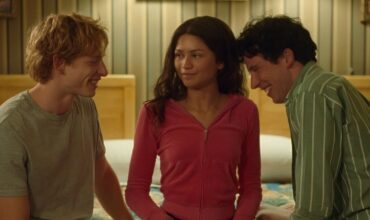L’été dernier (Last Summer) plays on some trite French cinema cliches to produce a delicate but ultimately boring look into a twisted French family. Based on the 2019 Danish film Queen of Hearts, Catherine Breillat created a more erotically charged version that followed the same storyline – a middle-aged woman has a taboo affair with her husband’s teenage son from his first marriage. This does not stray too much from Breillat’s previous works that tackled similar themes of desire and social trespass. While L’été dernier has received critical acclaim across the globe, this reviewer found some elements engaging and some repulsive, but perhaps this is by design?
When her teenage stepson Théo (Samuel Kircher) is sent to live with her Anne (Léa Drucker) is initially supportive. Then his misbehaviour seems to catch up with him, threatening to jeopardise the peaceful life she shares with her powerful businessman husband Pierre (Olivier Rabourdin), and her two adopted young daughters. Ironically, she is a seemingly successful lawyer who specialises in protecting abused teenagers. When she catches Théo lying to his father, she sees this as an opportunity to extort him into becoming the model family member. Surprisingly Théo comes to the table and starts to engage positively with the family dynamic. To the audience’s further surprise, he falls in love with her. Anne, beginning to feel the connection in her marriage fading, submits to his desires and as their relationship flourishes, they can’t keep away from each other. However as the narrative develops, their tryst becomes more difficult to conceal, particularly with the volatile feelings of Théo in the mix.
One success of L’été dernier is the stunning cinematography. Dewy scenes in the French countryside, long grass and languid shots of idyllic riverbanks create a dream-like quality and richness throughout the narrative. This paired with a minimal soundscape imbues the story with a peacefulness and innocence that belies the unthinkable premise of the story. There are also several very successful moments of juxtaposition that help articulate the unhinged and consuming desire between Annne and Théo. The most notable are their lovemaking. The first focuses on Théo during their first carnal embrace; all twining limbs and burning lust. The second by contrast highlights Anne’s stillness and trace-like state – alluding to the development of bigger feelings on both their parts as they are drawn into the unnatural romance.
There is a certain uncomfortable element of Anne’s back story that Breillat hints to which may leave an unpleasant taste in the audience’s mouth. The way that Anne doesn’t want to tell Théo about her first sexual encounter. The fact that we learn that the girls are adopted as she can’t have children after a botched abortion. The way she has spent her life advocating for teens in trouble… All add up to the idea that Anne may have been the victim of statutory rape herself, and this might be a reason that she engages in a forbidden relationship herself.
The overall mood of the film is tense, as the penny drops and Anne finally understands the risks she has taken and the relationship with Théo becomes hostile. Here is where Drucker and Kircher shine as actors. Drucker transforms the initially carefree Anne to cold and tightly controlled as she scrambles to keep her reputation and marriage. Kircher however evolves from a promiscuous teenager to the beginnings of a predator – leaving Anne once again in danger. This is a major departure from the original Danish film, making Anne more sympathetic and demonising Théo, despite him legally being the victim.
While L’été dernier (Last Summer) is a beautiful film, with very strong casting supported by Breillat’s skillful directing, to really enjoy it you will have to suspend your moral compass and sympathise with a predator.
4/10


